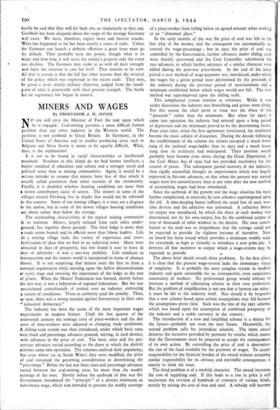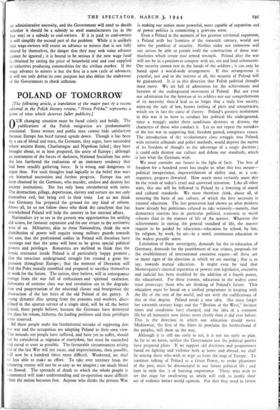MINERS AND WAGES
By PROFESSOR J. H. JONES
NO one will envy the Minister of Fuel the task upon which he is engaged. Coal-mining presents a more difficult human problem than any other industry in the Western world. The problem is not confined to Great Britain. In Germany, in the United States of America and in smaller producing areas such as Belgium and Nova Scotia it seems to be equally difficult. What, then, is the explanation?
It is not to be found in racial characteristics or intellectual standards. Nowhere in this island do we find keener intellects, a higher standard of education and culture and a stronger social and political sense than in mining communities. Again, it would be a serious mistake to assume that miners have less of that which is usually called patriotism than other sections of the community. Finally, it is doubtful whether housing conditions are more than a minor contributory cause of unrest. The miners in some of the villages around Pittsburg live in shacks that would not be tolerated in this country. Some of our mining villages, it is true, are a disgrace to the nation, but in some of the newer villages housing conditions are above rather than below the average.
The outstanding characteristic of the typical mining community is its isolation. Miners, largely isolated from each other under- ground, live together above ground. The local lodge is more than a trade union branch and its officials more than labour leaders. Life in a mining village lacks the variety of experience and cross- fertilisation of ideas that we find in an industrial town. Many were attracted in days of prosperity, but few found it easy to leave in days of adversity: it was a one-way mobility. Life conduces to
introspection and the remote world is interpreted in terms of abstract theory. It is not surprising that miners were the first to. form a national organisation while insisting upon the fullest decentralisation at every stage and stressing the importance of the lodge as the seat of power. When the Miners' Federation was formed, shortly before the last war, it was a federation of regional federations. But the war
necessitated centralisation of control over an industry embracing a variety of conditions. Those in authority paid the penalty. Then, as now, there was a strong reaction against bureaucracy in their own " industrial democracy."
The industry has been the scene of the most important wages
experiments in modern history. Until the last quarter of the nineteenth century the tonnage rates of piece-workers and the day rates of time-workers were adjusted to changing trade conditions.. A sliding-scale system was then introduced, under which basic rates were fixed and percentage advances granted, varying, in each district, with advances in the price of coal. The basic rates and the per- centage advances varied according to the dates at which the district schemes came into operation. The schemes outlived their popularity; but even where (as in South Wales) they were modified, the price of coal remained the governing consideration in determining the " percentage." Before the last war basic rates and percentage advances varied between the coal-mining areas far more than the weekly earnings of the men. Shortly before the outbreak of that war the Government introduced the "principle" of a district minimum or subsistence wage, which was intended to prevent the weekly earnings
of a piece-worker from falling below an agreed amount when working at an " abnormal place."
In the early months of the war_ the price of coal was left to the free play of the market, and the consequent rise automatically in- creased the wage-percentage ; but in 1915 the price of coal was controlled by the Government, further advances under sliding scale were thereby prevented and the Coal Controller substituted flat rate advances, to which further advances of a similar character were added during the post-war price-boom.. At the end of the latter period a new method of wage-payment was introduced, under which the wages for a given period were determined by the proceeds of the industry during the previous period of ascertainment and a minimum established below which wages would not fall. The new method was superimposed upon the sliding scale.
This complicated system remains in existence. While it was under discussion the industry was flourishing and prices were, rising. For this reason the chief point at issue was the share of the " proceeds " rather than the minimum. But when (in 1921) it came into operation the industry had entered upon a long period of depression and the minimum proved to be the determining factor. Four years later, when the first agreement terminated, the minimum became the main subject of discussion. During the decade following the establishment of the scheme the miners occupied a much lower rung of the national wage-ladder than in 1913 and a much lower rung than its architects had anticipated. Their position would probably have become even worse during the Great Depression, if the Coal Mines Act of 1930 had not provided machinery for the control of prices. The subsequent partial recovery of the industry, then rigidly controlled, brought an improvement which was largely expressed in fiat-rate advances, so that when the present war started wages were less unsatisfactory than at any time after the new method of ascertaining wages had been introduced.
Since the outbreak of the present war the wage situation has been further complicated, at intervals, by new schemes superimposed upon the old. A time-keeping bonus suffered the usual fate of such war- time devices and the adjective was jettisoned. A collective bonus on output was introduced, by which the share of each worker was determined, not by his own output, but by the combined output of tens of thousands of other workers in the district. His own contri- bution to the total was so insignificant that the scheme could not be 'expected to provide the slightest increase of incentive. Now
award ward has been issued which provides a minimum weekly wage for everybody so high as virtually to introduce a new prinCple: it destroys all that incentive to output which a wage-system may be expected to provide.
The above brief sketch reveals three problems. In the first place, it is clear that the present wage-system lacks the elementary virtue of simplicity. It is probably the most complex system in modern industry and quite unsuitable for an introspective, even suspicious, community of workers. No professional group would tolerate so intricate a method of calculating salaries in their own professien. But the problem of simplification is not one that a layman can solve: it must be left to the industry itself. Nor should it be forgotten that a new scheme based upon certain assumptions may fail because the assumptions prove false. Such was the fate of the 1921 scheme, which was based upon the assumption of combined prosperity in the industry and a stable currency in the country.
The introduction of a new and simplified scheme is a matter for the future—probably not even the near future. Meanwhile, the second problem calls for immediate solution. The latest award destroys the incentive provided by payment by results, which means that the Government must be prepared to accept the consequences of its own action. By controlling the price of coal it determines the size of the fund available for the payment of wages. To accept responsibility for the financial burden of the award without accepting similar responsibility for its obvious and inevitable conseqUences is merely to shirk the issue.
The third problem is of a twofold character. The award increases the cost of supplying coal. If this leads to a rise in price it will necessitate the revision of hundreds of contracts of various kinds, mainly by raising the cost of iron and steel. A subsidy will become an administrative necessity, and the Government will need to decide whether it should be a subsidy to steel manufacturers (as in the last war) or a subsidy to coal-owners. If it is paid to coal-owners it will simplify the second part of the problem. While it is unlikely that wage-earners will resent an advance to miners that is not fully shared by themselves, the danger that they may seek some advance cannot be ignored ; it is bound to be serious if the new wage fund is obtained by raising the price of household coal and coal supplied to industries producing commodities for the civilian market. If the wage advance to miners is but the first in a new cycle of advances, it will not only defeat its own purpose but also defeat the endeavour of the Government to check inflation.



























 Previous page
Previous page